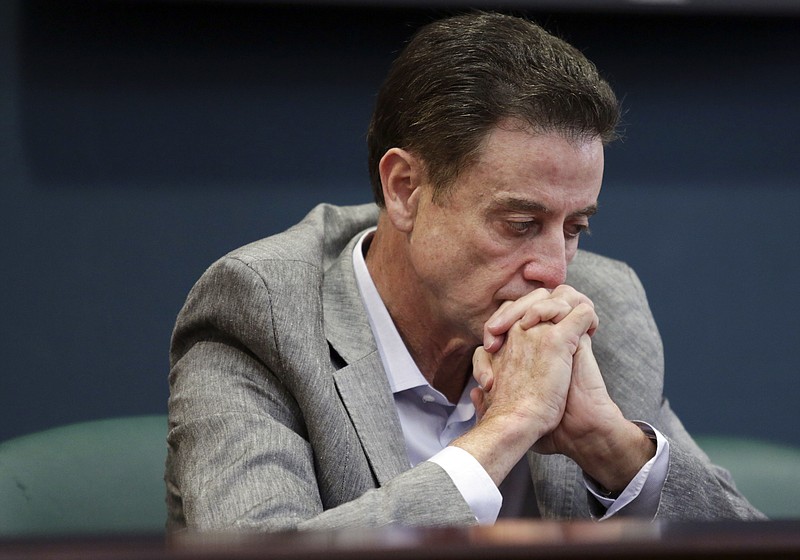What if disgraced former Louisville basketball coach Rick Pitino is telling the truth when he says he knew nothing about a former Adidas shoe company executive orchestrating a $100,000 payment to former Cardinals signee Brian Bowen?
That question may have a surprising answer, if one is to believe early government testimony in the first of three criminal trials involving bribes and other corruption in college basketball.
According to Tuesday testimony in U.S. District Judge Lewis A. Kaplan's New York courtroom, the government testified that former Adidas executive Jim Gatto, former AAU coach and Clemson player Merl Code and former sports agent Christian Dawkins conspired to funnel that money to Bowen's father, yet keep the deal from Louisville.
If the government's right, that this was done without Louisville's knowledge or encouragement, that $36 million lawsuit that Pitino is trying to win against his former employer might suddenly have legs.
If nothing else, the defense arguments for these cases appear to be crystal clear already.
No. 1 - The shoe companies kept their dirty deeds from the schools, which means the schools, and more importantly their coaches, shouldn't be held accountable for those rules violations.
No. 2 - Paying players' families, while against NCAA rules, is not against the law.
No. 3 - The only reason Gatto was making these deals was to compete with Nike, which is said to have a bigger wallet.
Or as Gatto's attorney, Casey Donnelly, told the court in her opening statement Tuesday: "The NCAA rules are the not the laws of the country. They're the equivalent of the rules in your apartment building. If you break them, you haven't broken the law. It is not against the law to violate NCAA rules."
This has long been an argument among those who despise college athletics' governing arm and believe it to be out of touch at best and a slave culture at worst.
Never mind that Pitino's program was previously soiled by "stripper-gate," which caused the NCAA to strip away its 2013 national championship over its use of prostitutes and strippers to entertain recruits. Or that he once engaged in an extramarital affair with the wife of an athletic department employee that led to her blackmailing him.
In something of a gift to all those schools linked to these charges - everyone from Arizona to DePaul to Kansas to North Carolina State to LSU to Miami, among others - Kaplan ruled that no past problems with the NCAA could be mentioned in this trial.
So Pitino and Louisville must concern themselves only with Bowen, and what the coaches knew, or at least what can be proven that they knew.
And if Tuesday be any indication of what we're going to hear moving forward - not only in this trial but the two that follow, including former Auburn assistant Chuck Person's Feb. 4 trial for allegedly accepting $91,500 to steer certain players to certain financial advisers - March Madness could lose at least a handful of high-profile programs to probation long before Selection Sunday.
Merely consider this quote from Kaplan: "(College basketball players) are not supposed to be paid to go to the University of Louisville, instead of Michigan State or somewhere else. They are entitled to get an athletic scholarship if the school gives them, but that's that. They are not supposed to be paid to play in college."
And he's right, at least by the NCAA rule book.
Yet according to Donnelly in her opening remarks, everyone, or at least every shoe company, is paying somebody.
She said Tuesday that evidence will show that Gatto approved the $100,000 to the Bowens only because Nike-sponsored Oregon offered the player's family "an astronomical amount of money" to join the Ducks.
Donnelly also alleged that current North Carolina freshman Nassir Little (or his family) was to be paid $150,000 to sign with Miami to keep him from signing with Nike-sponsored Arizona. She also said Gatto helped the Kansas program by approving $20,000 to Jayhawks recruit Silvio De Sousa's guardian so the guardian could reimburse Under Armour, which reportedly had paid the guardian to sign with Maryland.
It's worth noting here that Under Armour founder Kevin Plank is a former Maryland athlete.
As Donnelly addressed the jury Tuesday, she said, "The basketball coaches would ask for (Gatto's) help in recruiting particularly talented basketball players to their programs. I suspect you know what kind of 'help' the coaches wanted from Jim."
We all know what kind of help those coaches wanted. But unless the government can prove the coaches of these programs knew the real definition and amount of that help, that supposedly keeping it from them was merely for the families of recruits to think they didn't know, Pitino might yet become $36 million richer, however much poorer his reputation.
"NCAA rules were broken," Donnelly told the jury. "We are not going to waste your time pretending these families did not get funds."
The bigger, better question is how much longer we're going to waste our time believing that major college athletics isn't already too broken to be fixed.
Contact Mark Wiedmer at mwiedmer@timesfreepress.com
